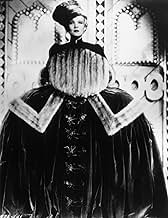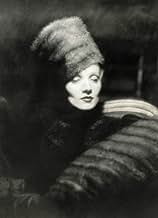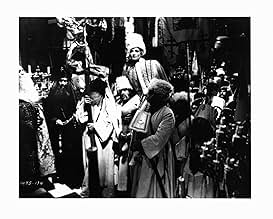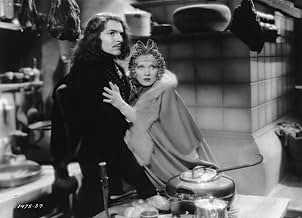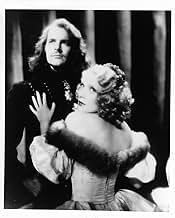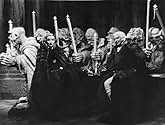Una mujer de la nobleza alemana contrae matrimonio sin amor con el heredero torpe e inestable al trono ruso, y luego planea expulsarlo del poder.Una mujer de la nobleza alemana contrae matrimonio sin amor con el heredero torpe e inestable al trono ruso, y luego planea expulsarlo del poder.Una mujer de la nobleza alemana contrae matrimonio sin amor con el heredero torpe e inestable al trono ruso, y luego planea expulsarlo del poder.
- Dirección
- Guionistas
- Elenco
- Premios
- 1 premio ganado en total
- Count Lestoq
- (as Phillip Sleeman)
- Ivan Shuvolov
- (as Hans von Twardowski)
- Sophia as a Child
- (as Maria)
- Lackey #5
- (sin créditos)
- Count von Breummer
- (sin créditos)
- Sophia's Aunt
- (sin créditos)
- Dirección
- Guionistas
- Todo el elenco y el equipo
- Producción, taquilla y más en IMDbPro
Opiniones destacadas
This was a movie about excess as much as anything, curtains that go on forever, huge doors, loud music, etc. They just don't make them like this anymore and certainly couldn't afford to then, either.
I don't think I ever saw Marlene anymore sensual than in this film, and I agree, her idea of playing a 'poor innocent gal'-that isn't put across well at all. Sometimes you just can't fake it, no matter how hard you try.
*** outta ****, style over everything.
All this takes form and depth, is sculpted by director Sternberg's haunting lighting. It is "his" light, he lords over it, and with it anything is possible. He can make a face beautiful or ugly, innocent or evil. He can accentuate a certain side of a person's nature, or how a specific set piece relates to it, all with the proper illumination.
If his lighting is astounding, equally so is Sternberg's use of the visual motifs in his mise en scene (bells, veils, figures, specific set pieces, etc...) to transport the viewer back and forth through the film. For instance, the binding of Catherine and Peter's hands at their marriage is later echoed by an unquestionably similar knot Catherine ties in a napkin she is fondling, and then tosses onto the table of she and Peter's last meal together. The initiation of their marriage and the initiation of its end are in this way linked, and the audience is forced to take into account the changes in both their characters. Not only does the rhythm of these motifs remain figurative. The movement of the film takes on a distinct rhythm as well. A swinging motif is evident throughout, the bells, the incense burners, Catherine's swing, the hoopskirts, a baby's basket, and so on. In this the film takes the feel of a frenzied, but excellently choreographed dance.
But in all this there is one thing more noteworthy. Marlene Dietrich radiates! Quite possibly the most beautiful woman who ever lived, she begins innocent and virginal (seemingly intentionally melodramatically), standing out in a world of amorality. She is both the happiest and saddest point of the film. Her wedding to the vulgar Peter in an immense, yet claustrophobic cathedral is the most emotional part of the film. As it is filmed entirely in a series of close-ups of individuals, and long shots that blur their faces, there is no discernible eye connection between any of the characters. She is completely alone. As a voyeuristic camera cuts closer and closer to her trembling, veiled face, we suddenly feel the need to turn away. We know now that this last thread of decency is about to be crippled. Soon enough her innocence begins to fade before her sexuality, and the surroundings that once nearly suppressed her, she lords over, a queen of immorality.
"The Scarlet Empress" expresses the essence of film, and why it succeeds as an art form. It creates the possibility of a world almost wholly artificial, divorced from anything that ever was. It retains only fragmentary reproductions of something that existed in a pre-filmed state, combining and distorting them to effect something 90% fake. What's more that seems all it is interested in. No other artistic medium (aside from painting) is viewed worthy of its visuals, and all theatrical, literary, or other requirements are given little attention. They are flippantly thrown in only to please a narrow minded audience, and occasionally (but very, very rarely) to accentuate the films themes. Yet painting, ah yes, painting. That was a medium worthy of a brilliant visionary like Sternberg, and one he transferred to the screen with gusto. "The Scarlet Empress" is to Dali in its obsession with the bizarre, da Vinci in its detail, Picasso in its complexity of associations, but entirely Sternberg in its conception.
Director Josef Van Sternberg, dubbed (correctly) "A lyricist of light and shadow" by one critic, proves this point in "Scarlet Empress" more than in any other of his films. Sternberg also knew he was losing Dietrich, and I like one scene where an actor is made up (from a side view) to resemble Sternberg. This actor is essentially the only one Marlene refuses her bed to, despite having no qualms about bedroom antics with half the Russian court. Sternberg projected himself into the role of Count Alexi, a character who has more screen time than anyone other than Dietrich. Alexi is teased by Dietrich and in the end he, um "doesn't get the girl." Sternberg knew he was no longer getting Dietrich and put this knowledge on celluloid with an awe-inspiring, even malicious fire. There are two things in this film which I really LOVE. The grotesque replicas which saturate the film are of course indicative of how the film will play out. The replicas, I suspect, were not easy or inexpensive to make--which makes them all the more fascinating, horrifying and MESMERIZING!
The background score. I have never seen a drama from the 1930s which used music more brilliantly than "Scarlet Empress." In a scene in a stable, when there is a chance that the two principals may make love, they are interrupted by the braying of a horse, which had been out of sight of the two. (According to many historians, this scene has much, MUCH deeper significance than it seems.) I cannot write what the historians have told to me on this board. It would be inappropriate. But before the horse neighs in that scene, Dietrich is twirling from a rope, and the music in the background lends immense eroticism to the scene, as does a straw which keeps going into and out of Marlene's mouth. The music combined with the beautiful lighting is stunning! There is also an opening torture scene which features a man swinging to and fro inside a huge bell, his head causing the bell to peal. Then, a quick dissolve to an innocent young lady who is flying high on her swing. THAT is a feat of genius!
If you can ignore some historical inaccuracies, which I suggest you do, and allow yourself to gorge on the beautiful lighting, music, as well as most scenes, I dare you to tell me that the film didn't MESMERIZE you! A TEN!
This pre-Production code film is a treasure throughout
During the entire picture, what stood out were the amazing sets. The film begins with some very graphic torture chamber scenes that are definitely "Pre-Code" in that they are so frightening and because of the copious amounts of gratuitous female nudity. While this never could have been allowed once the stronger Production Code was implemented around 1935, it is a captivating and bizarre introduction to the movie and it certainly got your attention!! Then, throughout the film, the sets were magnificent and very twisted--almost like they had been inspired by a combination of LSD, Jean Cocteau's version of BEAUTY AND THE BEAST and the paintings of Hieronymous Bosch! Twisted and grotesque anthropomorphic statues, banisters, candelabras, chairs, etc. grace practically every scene inside the palace--making it look like a combination of Hell and whimsy!! You really just have to see it all to believe it. What was also amazing was how Paramount was able to construct all this without the production bankrupting the company!!! While the dialog and acting is fine, they take a definite backseat to the sets. It's very obvious that Von Sternberg really wasn't trying to humanize the characters or shed too much light on the life of Catherine--it was really more of a work of performance art. And if you accept it as this and NOT an absolutely true recounting of the life of Catherine, then you will be in for a treat.
As for the historical side of the film, there has long been some disagreement about the coup and subsequent execution of Catherine's husband. While it is almost undoubtedly true she orchestrated it (after all, they made her their leader after Peter's death), what isn't so certain is the character of Peter. Some accounts have described him as half-witted or insane (exactly how he's shown in the film) but others doubt if this was exactly the case--it could have just been propaganda used by Catherine to justify her actions. Plus, when Peter died, some apparently reported this was of natural causes and not murder! Considering everything, though, the film had to portray Peter III some way and the evil half-wit was an enjoyable choice--as Sam Jaffe looked so crazed and made the part come alive with his insane-looking eyes and wonderful delivery! Dietrich herself was also very good (perhaps due to her not being so "artificial-looking" like she was in some of her other films due to excessive makeup), but her performance was definitely overshadowed by the sets and Jaffe
By the way, I originally gave this film a very respectable score of 8. However, after seeing "The Rise of Catherine the Great" (which was made the exact same year and covered the exact same material), I saw that this Dietrich film was a lot better by comparison. I especially think that Dietrich and Jaffe were a much better Peter and Catherine than Elisabeth Bergner and Douglas Fairbanks, Jr. in the other film.
¿Sabías que…?
- TriviaMarlene Dietrich's own daughter Maria Riva portrayed young Sophia at the beginning of the film and it was her debut in movies.
- ErroresMost of the action takes place at The Kremlin in Moscow. The historical Empress Elizabeth, Grand Duke Peter and later Catherine spent most of their reigns in St. Petersburg, which during the 18th Century was a modern, Europeanized city.
- Citas
Grand Duke Peter: Why are those bells ringing?
[He opens the bedroom door and addresses a man in the hall]
Grand Duke Peter: Why are those bells ringing?
Capt. Gregori Orloff: I don't know, Peter.
Grand Duke Peter: How dare you address me like that! Who are you?
Capt. Gregori Orloff: My name is Orloff, and I'm on duty as guard.
Grand Duke Peter: I'll have your head for this insolence! You're addressing the emperor!
Capt. Gregori Orloff: There is no emperor. There is only an empress.
- ConexionesEdited from The Patriot (1928)
- Bandas sonorasSymphony No.4 in F Minor, Op.36
Written by Pyotr Ilyich Tchaikovsky
Excerpts played during the opening credits and incorporated into the score often
Selecciones populares
- How long is The Scarlet Empress?Con tecnología de Alexa
Detalles
- Fecha de lanzamiento
- País de origen
- Idioma
- También se conoce como
- Catherine II
- Locaciones de filmación
- Productora
- Ver más créditos de la compañía en IMDbPro
Taquilla
- Presupuesto
- USD 900,000 (estimado)
- Total a nivel mundial
- USD 3,353
- Tiempo de ejecución
- 1h 44min(104 min)
- Color
- Relación de aspecto
- 1.37 : 1


